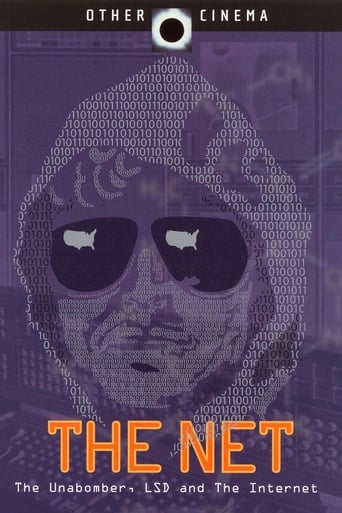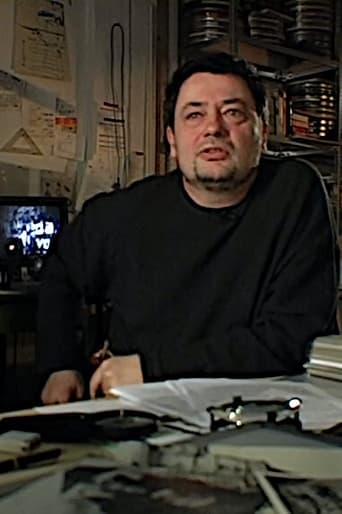

The Net (2003)
More of a film essay - of the type pioneered by Orson Welles and Chris Marker - than a standard documentary, German filmmaker Lutz Dammbeck's The Net: The Unabomber, the LSD and the Internet begins with the typical format and structure of a nonfiction film, and a single subject (the life and times of mail bomber Ted Kaczynski). From that thematic springboard, Dammbeck branches out omnidirectionally, segueing into a series of thematic riffs and variants on such marginally-related subjects as: the history of cyberspace, terrorism, utopian ideals, LSD, the Central Intelligence Agency, and Cuckoo's Nest author Ken Kesey and his Merry Pranksters.
Watch Trailer
Cast


Reviews
Best movie of this year hands down!
Excellent, Without a doubt!!
Story: It's very simple but honestly that is fine.
It is an exhilarating, distressing, funny and profound film, with one of the more memorable film scores in years,
There is no denying the facts uncovered by Mr. Dammbeck. If you are a student of the history of technology, of computing especially, and its relationship with society then this film is a must see.It raises questions which have never been addressed elsewhere. Indeed Mr. Dammbeck discloses that the biases are "systemic".For example, Why did "Silicon Valley" develop in California? Why is the University of California a beacon of BOTH computer science education, and the vanguard cultural movements in the 60s? How exactly were computers marketed to the public at first? In what context? How was the decision to disseminate the mass consumption of computation taken? (This is WAY beyond the "chicken and egg" problems of scope Guy Kawasaki faced with marketing Apple PCs to the public.) What are the Taboos underpinning our technological society? Who benefits from these taboos? What has Thom Friedman left out in his discussion of our presently Global, multi-ethnic society?This is a spare, lean philosophical exploration of things never or rarely discussed in the media, but it is extremely relevant to our present!A Must See, especially for engineering students.
The term "post-human" refers to the postmodern status of the human being transcending beyond the boundaries of biology and genetics and into the cyborg reality of ultimate reliance on technology. That reliance is translated as more of a symbiotic relationship than that of an addiction or psychological dependency. Information technology is at the forefront of analysis into post-human critics and thinkers, as humanity has seemingly willingly jacked itself in to a hive construct with mass communications and productions of personal computers, cellphones, and other networking devices. Front and center, really, of all that is the Internet. Tied in to the Internet is its industrial-military beginnings. And where most of humanity seems to generally accept these new ways of living with only cursory glances as to its implications and consequences, for the most part there is still an undercurrent of unease running under and through the signals shot around our atmosphere. For some people, this unease is the source of a desperate need to look at these technologies and ask the question of what they are doing to us, instead of for us. This movie, The Net, is simply the best documentary on that vein I've yet seen.What this movie is essentially is Lutz Dammbeck dialoging with Ted Kaszynsky and his victims. Center to that is the relationship between technophobia and technophilia, the integrated relationship between that technology and contemporary history, cyberpunk mentality, and our new way of viewing ourselves as information carriers as opposed to psychobiological vassals. All of these concepts provide the bigger picture. The details are disturbing, but still open to interpretation. Dammbeck is not interested in placing a specific value into his documentary, but traveling around the nation and letting the values speak for themselves. He even has a woman narrate his role, kind of like Chris Marker in Sans Soleil. All along he keeps a written correspondence to Kascynsky, which makes for an interesting character study in and of itself.A good point is made within the movie that as technology changes, our relationships and perspectives of ourselves change with it. This is meant to detail the reason why the Internet has interdigitated itself into our lives, but it also should be understood to mean that these ideas might justifiably change. Who knows what the future holds for us, really? The issue at stake is, as always, do you use technology as a tool, or a weapon? --PolarisDiB
This is a German documentary about the rise of the internet, mind control and other military experiments and the unabomber, Ted Kaczynski. Told through interviews with various people who were involved with the various subjects the film is more an essay on the change in society and the encroachment of technology for better or worse into our lives. Linking it all together is the story of Kaczynski who's actions were some how connected to the people interviewed. As a look at the rise of the thing we call the internet the film is quite good and thought provoking weaving together a fabric of information that probably wasn't well known before.The problem with the film is that making Kaczynski a focal point the director often goes off the rails, indeed almost all of the people interviewed abruptly end the interview when the unabomber is mentioned. This would be okay since what we get up to that point is often choice material, however by the time the final credits roll we are not certain what the point of including Kaczynski was. Is he a hero or villain? Does he side with or against him? Is he really connected to all of the other subjects as the filmmakers seem to think he is? I don't think so. Certainly if he's siding towards anti technology there is the chance of being hypocritical since it clear how much of the film comes from computers, the net and other sources of technology.I'm a bit flummoxed by the film. Certainly the film is thought provoking and eye opening but in the end it falls apart. Allowing for its final crash this is a film that I look forward to seeing again. It simply has too much material to tickle the gray cells to ignore. Worth a look for those who want to be made to think.
Where does technology lead us? Ted Kaczynski, the ex-Mathematician who lived a secluded life in the woods until he was arrested and convicted as the "Unabomber", believes that it will be our doom.Lutz Dammbeck confronts us with a puzzle, looking for connections between technological positivism, mind control experiments and the hippie movement, all traced back to state power interests developing as results of World War II. However, the links are weak, and instead of presenting us with a final conclusion resulting from his research (as other documentarists would eagerly do), Dammbeck simply leaves us to solve the puzzle by ourselves, strengthen or break the links as we find appropriate, raising interesting questions on science, technology and human's role in society along the way.Thus the movie's subject reaches far deeper than the "Unabomber's" biography, which is, in Kaczynski's own words, irrelevant. The movie provides a platform for Kaczynski's critique on technological positivism, which Dammbeck seems to at least partially sympathize with. However, the final decision is left to the viewer, who is aided by additional background and research material on the movie's website.Dammbeck is coming from an artistic point of view, consciously and deliberately breaking the limits between what is art and what is "real life", creating a disturbing, thought-provoking documentary. It is admirable and a sign of true plurality that publicly financed institutions such as SWR and arte stand behind an unconventional project that handles such a provocative subject seriously.




